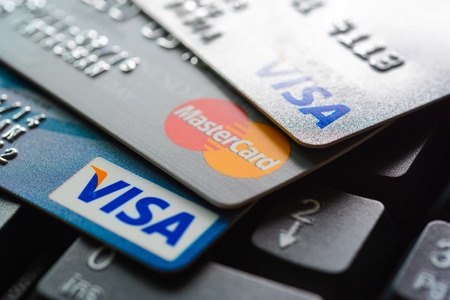Credit Cards – Early Studies
In 1986, a professor at Purdue University placed a group of study subjects at a variety of tables in a restaurant. Some of the tables had Visa (NYSE:V) and MasterCard (NYSE:MA) logos, while some did not. The subjects at the logo tables were found to leave larger tips than those at the other tables.
In 2001, another study reinforced this idea of a ‘credit card premium.’ Basically, the same person, in the same situation, will spend more money if they are paying with a credit card than if they are paying with cash. It might not seem like a big deal to spend $15 for lunch if you have a credit card with a several-thousand dollar limit, but if you only have $20 in your pocket, and you were still hoping to grab some toiletries on the way home, you might find a way to eat for less.
Study after study has reinforced this effect. Now you see why stocks like MasterCard (MA) and Visa (V) have fared so well. But, it pays to look at the other side of the equation from a personal finance level.
Credit Cards – Can consumers ‘control’ them?
A Minneapolis/St. Paul author and financial educator, Ruth Hayden, advocates that people put away the credit card as much as possible, and instead fill a group of envelopes with cash at the beginning of each month. $500 for groceries, $200 for dining out, $100 for household needs, etc. This forward-looking budget has the ability to help you make positive changes, rather than the rear-looking budget that many people use, where you track spending that has already happened. With the envelope system, you might still carry a credit card for buying gas, and for the occasional online purchase, but the idea is that you can take control of your spending, rather than letting your spending control you.
In the world of financial advising, almost none of my clients fit into the profile of ‘spenders’ or ‘savers.’ I would categorize someone with a true spending problem as someone who has taken bankruptcy once or twice, or has severe credit card debt that they are unable to repay. I would categorize a pure ‘saver’ as something of a financial purist, eating cold oatmeal for dinner to save money on both the energy bill and the grocery bill. Most people are more complex. Many people I have talked with have saved significant amounts for retirement, so they are ‘savers,’ and yet they also would readily admit to some spending problems in one or more areas of their life.
I would invite you to read the article ‘Always Leave Home Without It,’ which suggests that the ‘penalty’ we pay for using credit cards instead of cash can be up to 100%. So if you are someone who wonders where all the money went at the end of the month, and feel like your inner ‘saver’ is unfairly stymied, try using cash for 30-days.
Thanks for reading and have a great rest of your weekend.
Sources:
https://www.nytimes.com/2016/03/27/your-money/credit-cards-encourages-extra-spending-as-the-cash-habit-fades-away.html – credit card
https://www.psychologytoday.com/blog/the-science-behind-behavior/201607/does-it-matter-whether-you-pay-cash-or-credit-card – credit card
https://web.mit.edu/simester/Public/Papers/Alwaysleavehome.pdf – credit card
Any opinions expressed herein are solely those of the author, and do not in any way represent the views or opinions of any other person or entity.









